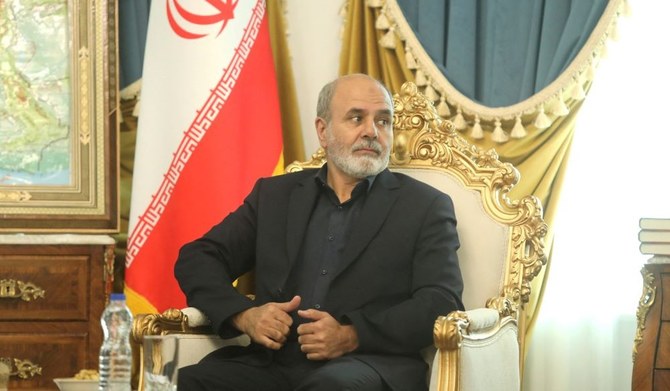
The militarization of Iranian politics in the context of regional detente
Secretary of the Supreme National Security Council, Ali Akbar Ahmadian, Tehran, Iran, May 29, 2023. (Reuters)
At a time of renewed regional dialogue and an apparent opening between Iran and its neighbors, one might be surprised by the appointment of Ali Akbar Ahmadian, former commander of the Islamic Revolutionary Guard Corps and member of the Council of Opportunity, as the new secretary. of the Supreme National Security Council. Although this position is under the control of the Supreme Leader, this is a central place in Iran’s decision-making process.
Ahmadian’s profile bears similarities to that of his predecessor, Ali Shamkhani. Both have experience in the navy, but Ahmadian has not been politically active since retiring from the military. On the contrary, former Secretary of the Supreme National Security Council Ali Shamkhani is a former Minister of Defense and presidential candidate. Ahmadian’s lack of political experience is a confirmation of the militarization of Iranian political dynamics since the late 2000s.
Shamkhani’s departure appears to have been hastened by the arrest and execution of his former colleague Alireza Akbari in January, following an accusation of espionage by Iran’s security apparatus. The link between Shamkhani and Akbari, a dual British and Iranian citizen, and the removal of the latter was a message sent to all members of the political elite: Presenting an alternative to the dominant view of Iranian hardliners is a movement risky, even. for the insiders (khodi) of the system (nezam). At a time of popular discontent within the country, the political establishment must be unified and support the views of the supreme leader.
Shamkhani’s impeachment is also a reminder of the political instrumentalization of corruption allegations within the Iranian establishment. He is a political survivor of Iran’s factional politics and served under both reformist and conservative presidents, from Hassan Rouhani to Ebrahim Raisi.
In the context of social and political tensions in Iran, it is not so strange that the reshaping of the decision-making process has taken place in favor of a military figure with no political past. Indeed, Shamkhani could have been an alternative to President Raisi’s political project, and his diplomatic achievement—the rapprochement with Saudi Arabia—has been a striking reminder of the late former president Akbar Hashemi Rafsanjani’s policy of détente toward the neighbors of iran
Shamkhani, of Arab ethnic origin, was not only a member of Iran’s political elite who was at the forefront of dialogue with Iran’s Arab neighbors, but also a key interlocutor for Western diplomats seeking compromise the Iranian security establishment. His removal is therefore a clear message to the reformist and pragmatic factions ahead of the parliamentary elections scheduled for February 2024. The system is prepared to accept a very low turnout rather than political infighting amid growing social discontent and an imminent economic crisis. .
His marginalization from Iran’s day-to-day decision-making process is also coming at the same time as the appointment of Iran’s ambassador to Saudi Arabia, Alireza Enayati, the first ambassador to the Kingdom in seven years. The timing of Shamkhani’s removal could be interpreted as a political clarification: Tehran’s decision to find a modus vivendi with Saudi Arabia is not the strategy of any political faction (and not a victory for pragmatist/reformist groups). but the choice of the system.
Last but not least, the securitization of Iranian politics and the removal of Shamkhani could be the result of two complementary dynamics. First, the supreme leader’s absolute dominance of the Iranian political system and his refusal to accept the emergence of any alternative political vision from the security establishment at the time of his succession process. Second, the need to find a regional solution to Iranian national socio-political problems. In other words, Iran’s political system is losing legitimacy at home and its foreign policy is no longer designed to seek regional hegemony at any cost, but to seek a new balance between the goal of strengthening security and ideological associations beyond Iranian borders and ensure the survival of the Iranian political system at home.
Shamkhani’s departure appears to have been hastened by the arrest of his former colleague Alireza Akbari.
Dr. AS Mohammed Al-Sulami
This does not mean an ideological change for Iran’s foreign policy, but a pragmatic implementation of the political and ideological goals of Supreme Leader Ali Khamenei. Ultimately, Shamkhani’s removal is a message to Iran’s neighbors: openness will be pursued if it serves Iranian security interests. The appointment of one of the military theorists of the asymmetric defense concept, Ahmadian, means that the new Iranian foreign policy will be based on the same ideological framework. What is new is that Tehran’s regional behavior is not, first and foremost, for the sake of regional domination, but is intended to manage the internal security crisis of the Iranian political system.
Dr. Mohammed Al-Sulami is president of the International Institute of Iranian Studies (Rasanah). Twitter: @mohalsulami
Disclaimer: The views expressed by the writers in this section are their own and do not necessarily reflect the views of Arab News
[ad_2]
Source link





